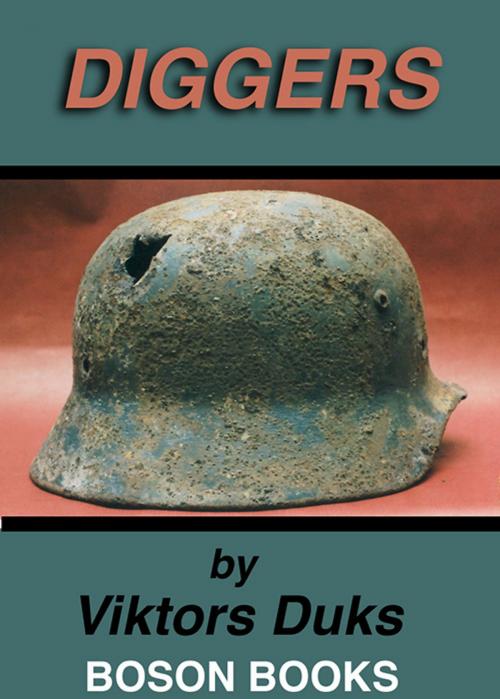Diggers: Discovering Artifacts from Two World Wars
Nonfiction, History, Military, Weapons, World War I, World War II| Author: | Viktors Duks | ISBN: | 9780917990533 |
| Publisher: | Bitingduck Press | Publication: | January 1, 2002 |
| Imprint: | Boson Books | Language: | English |
| Author: | Viktors Duks |
| ISBN: | 9780917990533 |
| Publisher: | Bitingduck Press |
| Publication: | January 1, 2002 |
| Imprint: | Boson Books |
| Language: | English |
The snake, half a meter long, was twisted around the handle of the pail from which I had just dumped 10 liters of swamp water and peat moss, as we worked to release a fuselage. I looked at it for a while and then grabbed it by one end and removed it from the bucket.
"Guys, look! Arent these the intestines of the flier?" I said to my colleagues, who were bailing water out of the hole. Their conversation and the splash of water fell silent for a moment. The diggers looked at me. The Classicist, standing at the other end of the ditch, agreed with me. "Those are his intestines." The Communicator, holding the intestines in his hands, put it more vividly: "Hes divided up into molecules here."
This book is the story—intimate and moving in the telling—of a group of Latvian men who refer to themselves as the Diggers. This platoon of digger colleagues gathers from disparate fields and disciplines. Digging in the old trenches and sunken bunkers of the Latvian forest, you may find, among others, the Communicator, the Classicist, the Forest Man, Little Spirit, and the venerable Legend.
Their human findings—sometimes grisly, like the "snake" above, and always thought-provoking—are handled as sacred objects. Their reverence extends to the skulls and bones of all the fallen warriors. German and Soviet ammunition and war materiel are so mixed together on some battlegrounds that the Diggers cannot determine whose side they are working on. Human remains are accumulated and reburied in marked graves. Every year bodies identified as Russian soldiers are ceremoniously turned over to the Russian ambassador to Latvia.
Their abiding interest is in discovering and preserving what happened in the Latvian forest during the two major wars of this century. As they uncover the large number of men left dead in their last defensive fortifications, the Diggers often think that their work is perhaps the only semblance of victory to have occurred in that place.
For author bio and photo, reviews, and a reading sample, go to www.bosonbooks.com
"Guys, look! Arent these the intestines of the flier?" I said to my colleagues, who were bailing water out of the hole. Their conversation and the splash of water fell silent for a moment. The diggers looked at me. The Classicist, standing at the other end of the ditch, agreed with me. "Those are his intestines." The Communicator, holding the intestines in his hands, put it more vividly: "Hes divided up into molecules here."
This book is the story—intimate and moving in the telling—of a group of Latvian men who refer to themselves as the Diggers. This platoon of digger colleagues gathers from disparate fields and disciplines. Digging in the old trenches and sunken bunkers of the Latvian forest, you may find, among others, the Communicator, the Classicist, the Forest Man, Little Spirit, and the venerable Legend.
Their human findings—sometimes grisly, like the "snake" above, and always thought-provoking—are handled as sacred objects. Their reverence extends to the skulls and bones of all the fallen warriors. German and Soviet ammunition and war materiel are so mixed together on some battlegrounds that the Diggers cannot determine whose side they are working on. Human remains are accumulated and reburied in marked graves. Every year bodies identified as Russian soldiers are ceremoniously turned over to the Russian ambassador to Latvia.
Their abiding interest is in discovering and preserving what happened in the Latvian forest during the two major wars of this century. As they uncover the large number of men left dead in their last defensive fortifications, the Diggers often think that their work is perhaps the only semblance of victory to have occurred in that place.
For author bio and photo, reviews, and a reading sample, go to www.bosonbooks.com
The snake, half a meter long, was twisted around the handle of the pail from which I had just dumped 10 liters of swamp water and peat moss, as we worked to release a fuselage. I looked at it for a while and then grabbed it by one end and removed it from the bucket.
"Guys, look! Arent these the intestines of the flier?" I said to my colleagues, who were bailing water out of the hole. Their conversation and the splash of water fell silent for a moment. The diggers looked at me. The Classicist, standing at the other end of the ditch, agreed with me. "Those are his intestines." The Communicator, holding the intestines in his hands, put it more vividly: "Hes divided up into molecules here."
This book is the story—intimate and moving in the telling—of a group of Latvian men who refer to themselves as the Diggers. This platoon of digger colleagues gathers from disparate fields and disciplines. Digging in the old trenches and sunken bunkers of the Latvian forest, you may find, among others, the Communicator, the Classicist, the Forest Man, Little Spirit, and the venerable Legend.
Their human findings—sometimes grisly, like the "snake" above, and always thought-provoking—are handled as sacred objects. Their reverence extends to the skulls and bones of all the fallen warriors. German and Soviet ammunition and war materiel are so mixed together on some battlegrounds that the Diggers cannot determine whose side they are working on. Human remains are accumulated and reburied in marked graves. Every year bodies identified as Russian soldiers are ceremoniously turned over to the Russian ambassador to Latvia.
Their abiding interest is in discovering and preserving what happened in the Latvian forest during the two major wars of this century. As they uncover the large number of men left dead in their last defensive fortifications, the Diggers often think that their work is perhaps the only semblance of victory to have occurred in that place.
For author bio and photo, reviews, and a reading sample, go to www.bosonbooks.com
"Guys, look! Arent these the intestines of the flier?" I said to my colleagues, who were bailing water out of the hole. Their conversation and the splash of water fell silent for a moment. The diggers looked at me. The Classicist, standing at the other end of the ditch, agreed with me. "Those are his intestines." The Communicator, holding the intestines in his hands, put it more vividly: "Hes divided up into molecules here."
This book is the story—intimate and moving in the telling—of a group of Latvian men who refer to themselves as the Diggers. This platoon of digger colleagues gathers from disparate fields and disciplines. Digging in the old trenches and sunken bunkers of the Latvian forest, you may find, among others, the Communicator, the Classicist, the Forest Man, Little Spirit, and the venerable Legend.
Their human findings—sometimes grisly, like the "snake" above, and always thought-provoking—are handled as sacred objects. Their reverence extends to the skulls and bones of all the fallen warriors. German and Soviet ammunition and war materiel are so mixed together on some battlegrounds that the Diggers cannot determine whose side they are working on. Human remains are accumulated and reburied in marked graves. Every year bodies identified as Russian soldiers are ceremoniously turned over to the Russian ambassador to Latvia.
Their abiding interest is in discovering and preserving what happened in the Latvian forest during the two major wars of this century. As they uncover the large number of men left dead in their last defensive fortifications, the Diggers often think that their work is perhaps the only semblance of victory to have occurred in that place.
For author bio and photo, reviews, and a reading sample, go to www.bosonbooks.com















